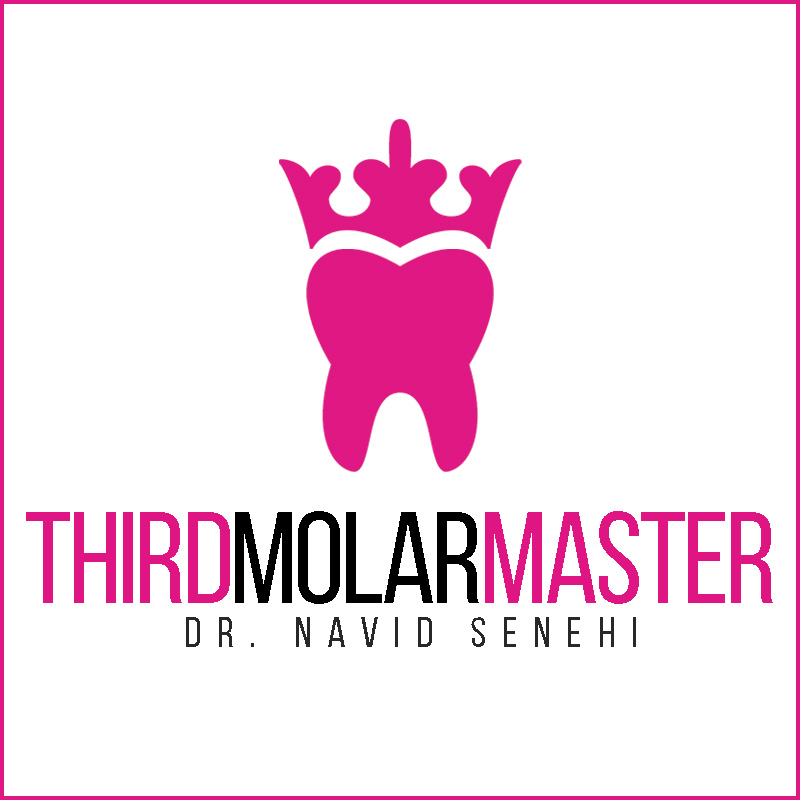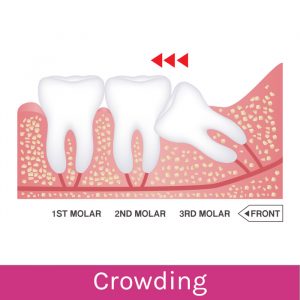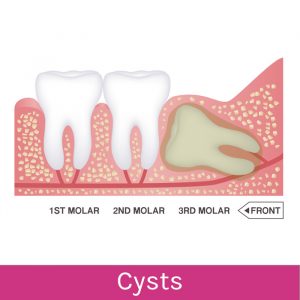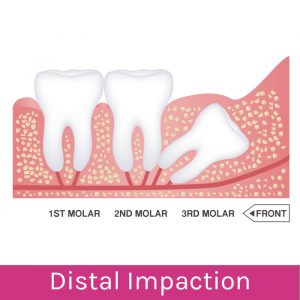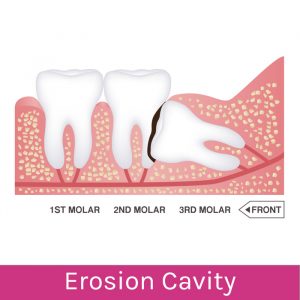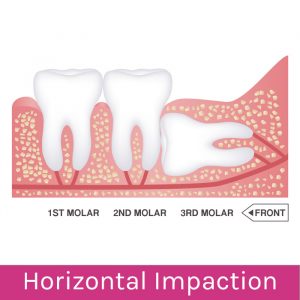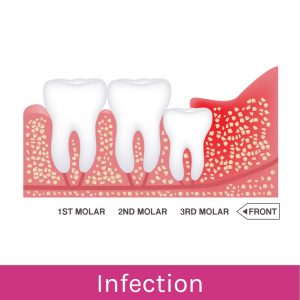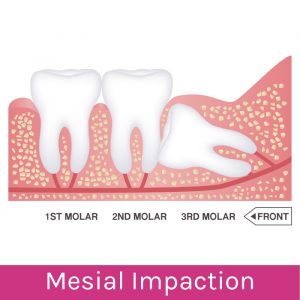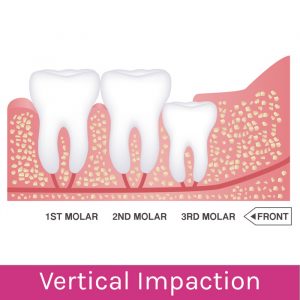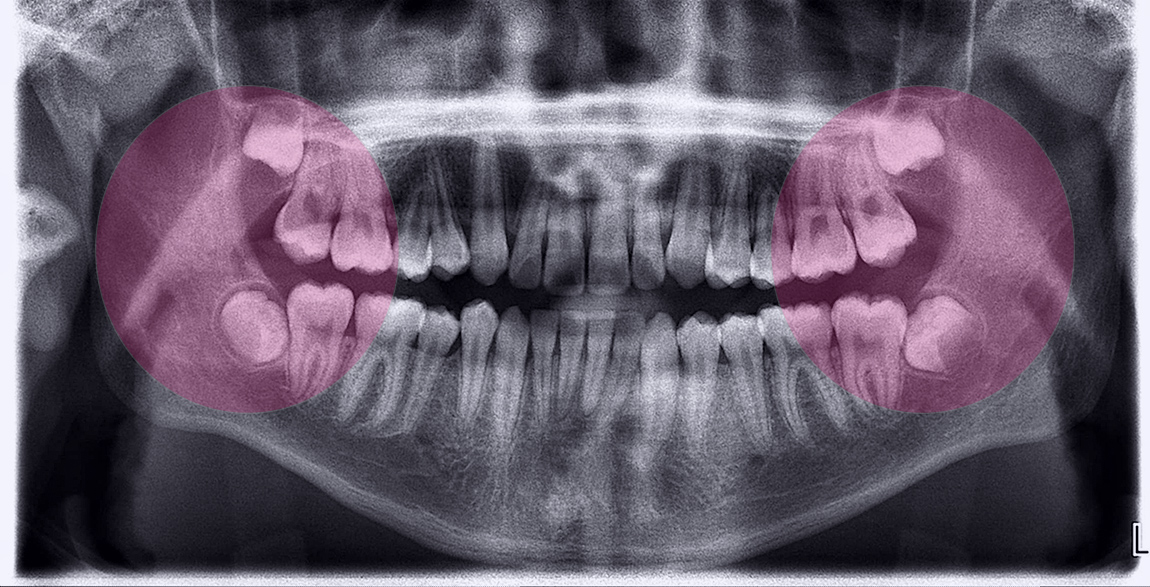
What Are Wisdom Teeth?
Wisdom teeth are the very last set of teeth to emerge at the back of a person’s jaw. Dentists refer to these late-emerging teeth as third molars. These teeth typically erupt between the ages of 17 and 21 years of age, two sets of wisdom teeth, one in each upper and lower corner of the jaws for a total of four wisdom teeth.
While there is evidence to suggest that these molars once played a critical role in aiding our primitive ancestors in the chewing and grinding down of tough roots and nuts, wisdom teeth are more associated with unnecessary pain, frustration, and trips to the dentist’s office in the modern era. Every year, millions of Americans both old and young have their third molars extracted. In fact, according to a study found in the National Institutes of Health's National Library of Medicine (NIH/NLM), nearly 5 million Americans a year have one or more of their wisdom teeth removed, with an estimated 10 million third molar extractions per year. Many do so as a precaution to avoid dental problems later in life.
Should I Have My Wisdom Teeth Removed?
Many oral surgeons and dentists recommend the removal of wisdom teeth as a simple precaution against future complications and problems that may be much more difficult to address after roots have fully formed and bones have completely hardened. When wisdom teeth are left alone, they can erupt at irregular angles resulting in a variety of dental issues including impaction, jaw damage, and dental crowding to name a few.
Occasionally, wisdom teeth don’t erupt at all and remain hidden below the gums and bone causing pain, cysts, and other pathologic conditions. This is known as impaction. Wisdom teeth can also erupt only partially, which can allow bacteria and food to become lodged below the gumline, which in turn causes inflammation and other serious problems.
When Should I Have My Wisdom Teeth Removed?
Conventional wisdom holds that wisdom teeth should be removed after they have formed but before they begin causing any problems. This means that wisdom teeth should be removed somewhere between the ages of 14 and 21. Many young adults have their third molars extracted after high school and before they go to college or join the workforce. Generally, oral surgeons and dentists will recommend extraction before impaction occurs or other related dental issues arise that could lead to potential irreversible complications during or after the procedure.
Preemptive extraction is the norm, although wisdom teeth removal after impaction is also common. If your wisdom teeth are causing or are expected to cause problems, you should have them removed. Patients who opt to wait for extraction should have their teeth carefully monitored by a dental professional.
"Appropriate level of training and experience is crucial when it comes to treatment of complex cases. Choosing the appropriate specialist is the key in avoiding or essentially eliminating potential irreversible complications."
--- NAVID SENEHI, DDS. MD.
Early extraction of potentially troublesome third molars can save patients from a lot of future problems and pain. However, whether or not to extract wisdom teeth immediately or leave them in place is a conversation between a patient and his dentist.
Each person’s wisdom teeth come in at different times and in different ways, making wisdom teeth extraction a procedure best approached on a case-by-case basis. In fact, many patients opt to have only one or two wisdom teeth removed while the other wisdom teeth are left in place if they are not deemed to be a risk. For most people though, having these troublesome molars dealt with earlier rather than later is worth it for the peace of mind and elimination of potentially serious future dental complications.
Many people assume that if there is no pain from their wisdom teeth, that they do not need to have them removed. While it is true that wisdom teeth will not cause problems for a minority of the general population, most people who opt to wait or ignore wisdom teeth removal are only delaying the inevitable. According to The American Association of Oral and Maxillofacial Surgeons, 85 percent of third molars will eventually necessitate extraction at some point in a person’s life.
Furthermore, many instances of wisdom teeth impaction occur with no pain or only minor incidences of pain. Only 12 percent of impacted third molars are associated with any pain at all. This can be misleading for patients who assume that the lack of pain equates with a lack of dental consequences. The truth is, severe dental consequences can still result from impacted or improperly erupted wisdom teeth with or without pain or other visible signs of pathology. Cysts, tumors, and other complications hidden deep beneath the tissue can occur without the patient noticing until the problem has become severe.
6 Signs It’s Time to Get Your Wisdom Teeth Removed
1. Alignment issues
Impacted wisdom teeth are known to cause jaw alignment and bite issues. This can be a major concern since an uneven bite can result in unpredictable dental wearing, damage to teeth, jaw pain and discomfort, and other problems associated with a misaligned bite.
2. Dental Crowding
Many people simply do not have the jaw space or room to accommodate a third set of molars. As a result, wisdom teeth growth often results in dental crowding and malocclusion. In many cases, malocclusion will require straightening treatments and orthodontics. Many young adults who undergo orthodontic therapies will have their wisdom teeth removed at the conclusion of their treatment to avoid future dental crowding.
3. Inflamed Gums
One common symptom of impacted or improperly erupted wisdom teeth is inflamed gums. Tissues in the area around wisdom teeth are prone to irritability and swelling as a result of a constant changes in the position of these teeth as well as colonization of bacteria. Swelling and inflammation, in turn, can make an already difficult area even harder to clean which can lead chronic infections. Inflamed gums around a wisdom tooth is a sure sign of pericoronitis which describes the pain and infection of the gum tissue surrounding a partially erupted or erupted third molar.
4. Cysts and Cavities
Like hair, teeth grow or develop from a follicle. A dental follicle is a sac of embryonic tooth cells contained within an odontogenic organ. As a healthy tooth erupts, the follicle eventually disappears. However, in the case of an impacted wisdom tooth, the follicle remains in place. Unfortunately, while tooth follicles help grow healthy teeth, when left in the mouth too long they can also cause dentigerous cysts, keratocystic odontogenic tumors, and ameloblastomas.
Dentigerous cysts, also known as follicular cysts, can grow and expand resulting in jaw fractures. Keratocystic odontogenic tumors are another type of cyst that, although rare and usually benign, can occur with third molar impaction. Ameloblastomas are much more dangerous and aggressive. They can be either benign or cancerous, however, in either case, ameloblastomas easily infiltrate and destroy adjacent bone tissues. As a result, ameloblastomas can result in severe abnormalities of the face and jaw.
5. Chronic Sinus Pain or Congestion
One result of hidden tumors, inflamed gums, and other pathologies associated with impacted or improperly erupted wisdom teeth is sinus pain, pressure, congestion, and discomfort. While sinuses may seem to have nothing to do with the teeth and jaws, the upper wisdom teeth are located very close to the sinuses.
Pressure from wisdom teeth development can actually cause sinus pain and congestion. Furthermore, infections of the wisdom teeth can also spread from the mouth to the sinuses. In rare instances, the roots of the upper wisdom teeth can actually extend into the sinuses. Removal of wisdom teeth in these difficult situations often requires the expertise of an oral & maxillofacial surgeon.
6. Jaw Damage and Disorders
Impacted wisdom teeth, or wisdom teeth that fail to erupt and remain underneath the gums, can also cause great harm to the physical structures of a patient’s jaws. Infections, cysts, and other growths caused by improperly erupted or impacted teeth weaken the jaw bone and can even result in deterioration or bone loss. Damage to the underlying bone structures can cause loss of other healthy teeth, that may be difficult to replace with conventional implants.
Impacted wisdom teeth are also known to cause a line of structural weakness within the jaw. When struck by an outside force, the jaw is more prone to fracture at this line of weakness.
In some cases, impacted wisdom teeth may become deeply embedded in the jaw bone with roots near the main nerves in the jaw. This situation can greatly complicate extraction and requires the experience and training of an oral & maxillofacial surgeon.
The Wisdom Behind Early Removal
To avoid all of the above symptoms and complications, many doctors and dentists recommend preemptive removal of wisdom teeth well before they begin to cause problems. Early removal before the roots of the wisdom teeth have completely formed and the surrounding bone has hardened is considered much safer than extraction procedures later in life. It is believed by many that healthy young adults are also generally better able to cope with the procedure and recover more rapidly than older adults. I believe one of the best times to have wisdom teeth removed is between ages of 16 to 18 years old following high school and prior to higher education or work profession. Wisdom teeth removal is so common at this age that many consider the procedure to be a rite of passage.
What If I Wait?
Waiting comes with risks that must be considered. Patients will want to consult with a dentist or an oral & maxillofacial surgeon to not only determine whether or not an extraction procedure is warranted, but also to help monitor the clinical condition. If a wisdom tooth becomes impacted or begins to cause dental issues, it should be promptly removed.
Who Should I Go to For Wisdom Teeth Removal?
Although considered a common procedure, wisdom teeth extractions are by no means simple or easy. On the contrary, successfully extracting wisdom teeth with minimal impact to the surrounding tissues, nerves, and jaw bone is often difficult and complex. In fact, a botched surgical process can cause more harm in the form of fractured jaws and permanent nerve damage.
The point of undergoing an extraction procedure is to prevent and avoid future complications. That is why going to the right specialist is critical. For treatment of complex cases, or in other words cases which are more prone to potential irreversible complications, patients should seek out an oral & maxillofacial surgeon like myself who specialize in these type of surgeries. These procedures are either performed while patients are awake, completely sleep, or somewhere in between. Appropriate level of training and experience is crucial when it comes to treatment of complex cases and choosing the appropriate specialist is the key in avoiding or essentially eliminating potential irreversible complications.
Call The Third Molar Master,
Dr. Navid Senehi, DDS. MD.
of Facial & Oral Surgery Institute Today
If you are concerned about your wisdom teeth, wisdom teeth extraction, or the potential consequences of waiting to undergo a wisdom teeth removal procedure, Dr. Navid Senehi of Facial & Oral Surgery Institute can answer all your questions. Dr. Senehi is a dual degree Oral & Maxillofacial Surgeon, DDS. MD. as well as referred to by many dental professionals and physicians as the "Third Molar Master."
Schedule a consultation today with Dr. Senehi. You can reach us at 818-805-0557 during normal business hours. You can also click the Chat button located in the bottom right-hand corner of this page and chat with a person from our team who is eager to help you. If you prefer, just click the Schedule An Appointment button below and we will help you get started with an initial consultation.
